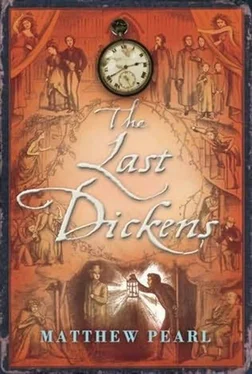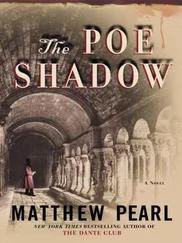The patient pulled off the silk scarf from around her neck. There was visible a white, almost translucent scar across the neck, deepest on the right end, in the shape of an unfinished smile, which gave Rebecca the urge to run her hand across her own neck to check that it was in one piece. “He was right. He looked like a poem,” Louisa said suddenly.
“Who did?”
“He looked like a poem, can't remember which poem though,” replied Louisa. Suddenly, she seemed to have an Irish accent, eerily like Tom Branagan's. “Too many poets in America today!”
“Tom Branagan. What was Tom right about?” Rebecca asked gently.
“The Chief and that actress,” she muttered. “ Nelly. He said the Chief loved her.”
“There have been many slanders about him in the press,” Rebecca said.
Louisa suddenly spoke as though the center of attention at a Beacon Hill dinner. “All well’ means to come. ‘Safe and well’ means not to come. While that nasty old widow was trying steal the Chief away for herself, I took it so nobody else would steal it and print it in one of the profligate papers!”
Rebecca waited for more, shaking her head. “I don't understand.”
“No, you don't! I'm sure you couldn't ever have understood, you're such a nice girl and dim-witted.”
Rebecca, frustrated, looked for help at the attendant, who was sitting patiently. In response, the attendant removed a pair of keys and silently motioned for Rebecca to follow her to a closet door on the other side of the room, away from Mrs. Barton.
“This is where we place the materials that have proven too combustible to her mind, Miss Sand,” said the woman quietly, bending down and pulling out a red calf-leather book, only a few inches tall and wide, that could fit in a small coat pocket. “She claims this was Charles Dickens's diary. Said she had taken it from a trunk in the Westminster Hotel in New York.”
Rebecca held out her hand to the attendant. “It did belong to Dickens, then?”
“We don't know,” the attendant answered. “After all, it's written all in some kind of cipher! This bird would stay up at all hours staring at the page to understand it.”
‘All well’ means to come! ‘Safe and well’ means not to come!” Louisa exclaimed vigorously from the other side of the room.
“What do you mean, Mrs. Barton?” Rebecca asked. When she could not extract any answer, she turned to the attendant and asked if she understood.
“I should think we would, miss! This little bird crowed the same thing every night for two weeks. She claims she found directions to decipher secret language that Charles Dickens would cable to England whether this ‘Nelly’ should come with him to America. If he cabled ‘all well,’ she would come. If ‘safe and well,’ she'd stay in Europe.”
“She didn't!” Louisa interrupted, her hands trembling and her chest heaving at the topic. “She didn't come! You see? The Chief told her safe and well, do not come. He didn't truly love her after all! He had come to finally find his great true love! As his Mr. Redlow would say to me, ‘Your voice and music are the same to me.’ That is why he found me. That is why he read to me all those nights at the Tremont Temple. Why he whispered to me after all those mean men had roped him into hating me!”
Rebecca knew she had to be careful if she wanted Louisa to say more and not exhaust herself to the point of being useless.
“Mr. Dickens-the Chief-wanted you to share with the world the message that he whispered to you the night that other man attacked you.”
Louisa seemed to consider this as she continued her steady nod. Suddenly, she stopped. “Yes, wanted all of it shared. He spoke the truth-he saw the future at last,” she said.
“Yes! What did he say?” Rebecca urged her.
She let out an exhale that seemed to have been stored up for years. “God help you, poor woman.”
Rebecca blinked. “That is what he said to you? That is everything he whispered?” That was all!
“God help you, poor woman!” Louisa repeated more vigorously, and in a voice that had the heft of Dickens's.
“Nothing else? You are certain, Mrs. Barton?”
“And God has. The Chief always spoke the truth. God has helped me!”
God help you, poor woman. Dickens, there to bless the unfortunate! Rebecca, dejected, thinking of all the time they had lost by coming here on her suggestion, signaled the attendant. She could not help lamenting how disappointed Osgood would be in the intelligence she would have to report, yet she also knew she had to tell him right away.
Louisa, her wasting spirits appearing lifted by all the talk of Dickens, did not seem to want the interview to end yet. “You were wrong, dear!” she said when the attendant began to escort Rebecca away. There were tears foaming in Louisa's eyes. “No street! No street!”
Rebecca told the attendant to wait.
“What do you mean, Mrs. Barton?” she asked, turning her attention with a fresh patience back to the boarder.
“You said I took him from the street. But that isn't true, not one whit. That carriage was stopped when I found it. That driver-trying to take the Chief away to who-knows-where!”
Rebecca considered this. They'd always thought Dickens had just hailed a cab to be taken for a late-night drive before returning to the hotel. The fact that the cab was sitting empty suggested that Dickens had hailed the cab with some place-some errand-in mind. Did Dickens have a particular destination the night before he would leave Boston forever? Rebecca was about to ask for more but Louisa was by this time determined to continue on her own.
“It was on North Grove Street,” said Louisa. “When he got back into the carriage, he didn't know I was driving it. Little did he know how our lives were destined to change forever from that point! Can the candle help it, my dear? Can the candle help it?”
“North Grove Street.”
THE WAITING DRIVER opened the carriage door for Rebecca. She climbed in and sat across from Osgood.
“It's the Medical College!” Rebecca cried.
“What-what do you mean? Was that what Mr. Dickens said to that woman?” Osgood asked.
“No, no.” Rebecca explained that Louisa Barton had tricked the driver as he was waiting for Dickens at North Grove Street. “He wasn't merely going out for another of his breathers,” Rebecca said. “He must have instructed the driver to go to the Medical College.”
Osgood thought back to the breakfast conversation between Dickens and Dr. Oliver Wendell Holmes.
Anything in Boston you haven't yet seen that you'd like, Mr. Dickens? Osgood had asked.
There is one place. I believe it is at your very school, Dr. Holmes. The place where Dr. Webster, whom I met twenty-five years ago, murdered Mr. Parkman in such extraordinary fashion. I would have staked my head upon it even then, that Webster was a cruel man.
“There may be something to find there,” Osgood said to Rebecca. “He had seen it already. Knowing Dr. Holmes, he had probably given Dickens a very thorough examination of it. If he really went back to that dismal place before he left Boston, he must have had a reason.”
“Let us go at once then!” This excited utterance came from the lips of Marcus Wakefield. He sat in the seat next to Osgood.
Osgood turned to him. “Mr. Wakefield, are you certain it is no trouble for us to use your carriage?”
Wakefield shrugged. “Of course! I hired it for the afternoon, and I haven't any pressing business until late. It is a pleasure to be of small assistance to my two American friends. Let me send a runner with a note to my trading associate, and my chariot and my humble self will be at your disposal until you are entirely finished once and for all with your expedition.”
Читать дальше












